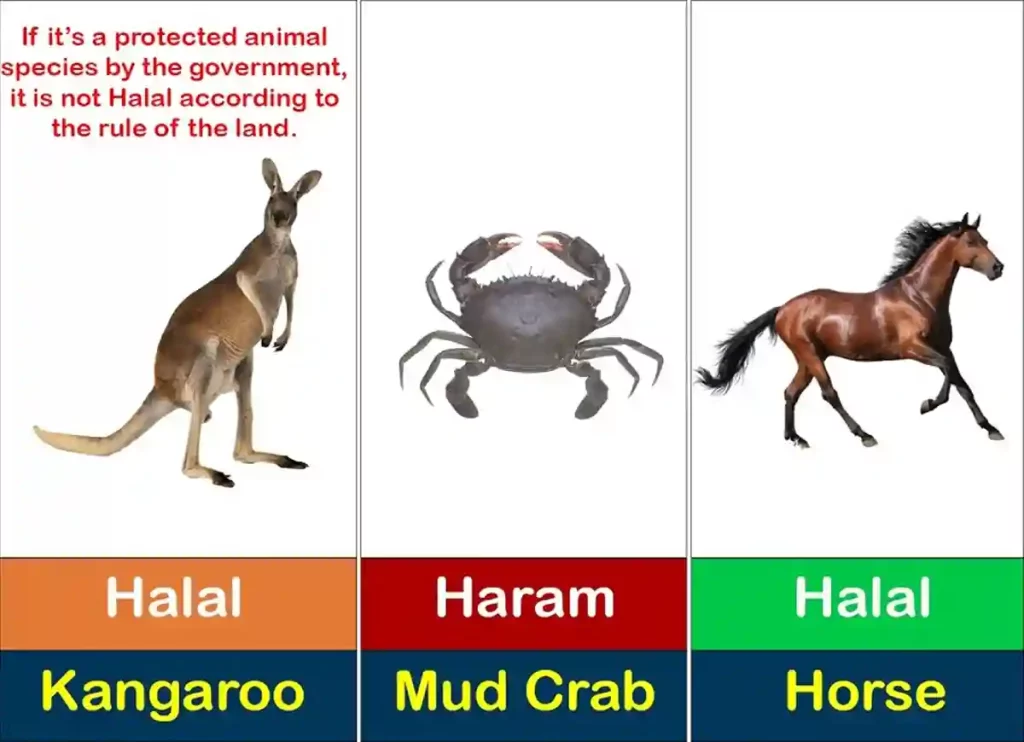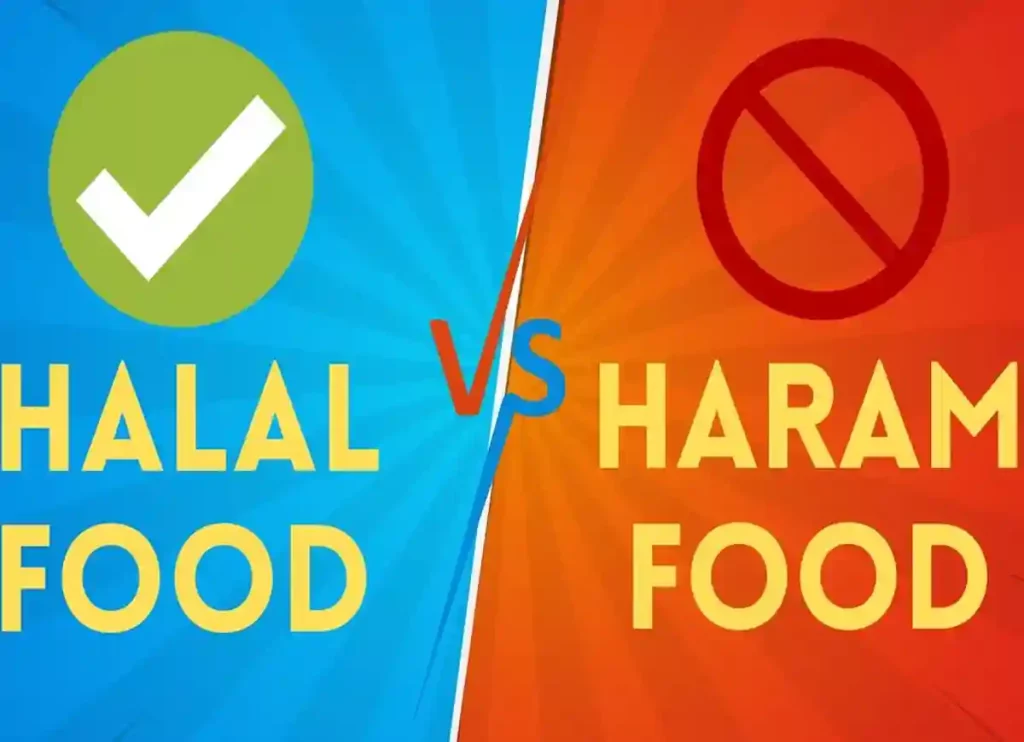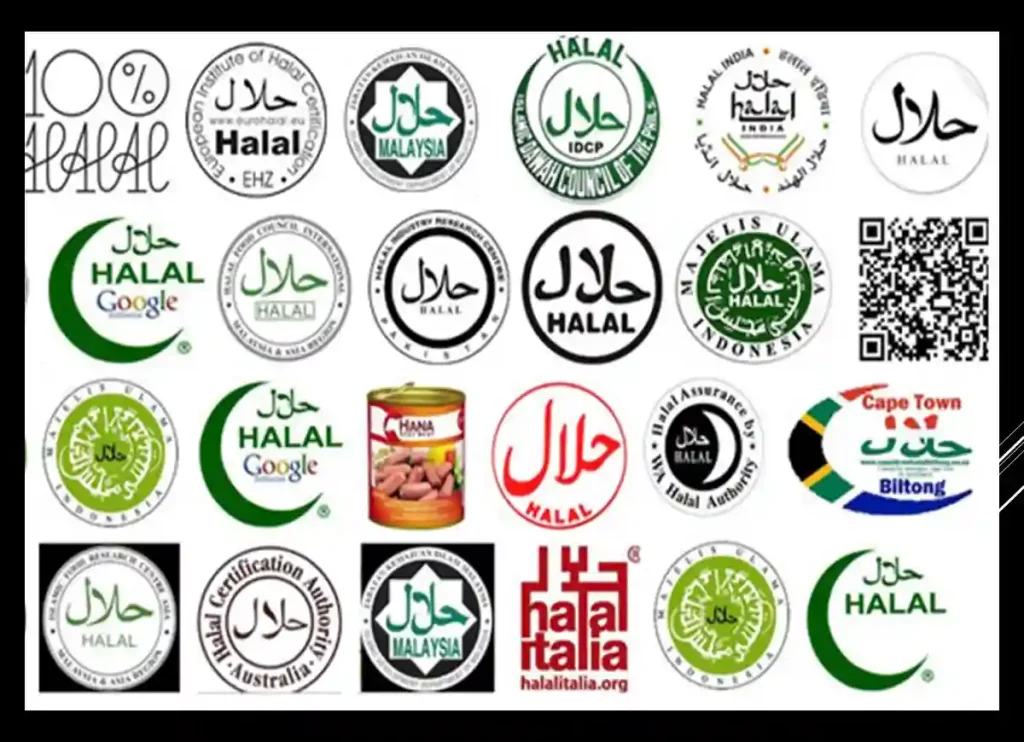Haram Halal – In Islam, the concepts of halal and haram play a significant role in guiding the lifestyle and choices of Muslims.
Halal, which means “permissible” or “lawful,” refers to actions, behaviours, and products that are considered permissible according to Islamic law
While haram, meaning “forbidden” or “prohibited,” refers to those that are deemed unlawful. These concepts are deeply rooted in the teachings of the Quran, the holy book of Islam, and the practices of the Prophet Muhammad (peace be upon him).
The distinction between halal and haram encompasses various aspects of life, including food and drink, financial transactions, social interactions, and ethical considerations. Muslims are encouraged to seek halal options and avoid engaging in haram activities or consuming haram substances.
Suggested Read: Is Coffee Halal
By adhering to these guidelines, believers aim to maintain spiritual purity, uphold their faith, and attain closeness to Allah (God).
Regarding halal food and drink, Muslims are instructed to consume what is lawful and pure, while abstaining from what is forbidden.
The Quran outlines specific dietary laws, such as the prohibition of consuming pork, blood, alcohol, and any meat that has not been slaughtered according to Islamic principles.
Additionally, the concept of halal extends beyond the ingredients themselves and encompasses the methods of preparation, hygiene, and the avoidance of contamination from haram sources.
In terms of financial transactions, Islamic principles emphasize fairness, transparency, and ethical conduct. Interest-based transactions (usury or riba) are strictly forbidden, and Muslims are encouraged to engage in halal business practices, such as profit-sharing, investment in permissible ventures, and avoiding exploitative or dishonest practices.
The concepts of halal and haram also extend to social interactions and ethical considerations. Muslims are encouraged to uphold modesty, integrity, and righteousness in their behavior, speech, and conduct.
Actions such as lying, backbiting, theft, and engaging in illicit relationships are considered haram, while honesty, kindness, respect, and fulfilling one’s obligations are encouraged as halal behaviors.
It is important to note that the determination of halal and haram is not solely subjective but is derived from Islamic jurisprudence and scholarly interpretations based on the Quran and Hadith (sayings and actions of the Prophet Muhammad).
Scholars and Islamic authorities play a crucial role in providing guidance to the Muslim community on matters of halal and haram, ensuring the adherence to Islamic principles and the preservation of spiritual purity.
Overall, the concepts of halal and haram hold immense significance in Islam, guiding the lives of Muslims and shaping their choices and behaviors.
By adhering to the principles of halal and abstaining from the forbidden, Muslims strive to lead a righteous and God-conscious life, seeking blessings and spiritual fulfilment in accordance with their faith.
You probably have heard “Halal” and “Haram” sooner or later, but you may not recognise what it is, what Muslims eat and now do not consume, and why. So here’s a breakdown of what the term Halal way is and what the period Haram way is.
Suggested Read: Is Vanilla Halal

What is the difference between Halal and Haram?
Halal and Haram are two Arabic words. They shape a critical part of how Muslim view all elements of life.
Halal: This is an Arabic phrase because of this lawful or permissible. It does not simply consult with things that a Muslim can devour but additionally encompasses everything lawful in a Muslim’s existence. Nevertheless, it’s far most customarily uttered in connection with food.
Haram: Haram is the Arabic word contrary to Halal; it is forbidden or unlawful for Muslims to devour, use or do.
Halal and Haram within the Qur’an
Here are a number of the verses within the Qur’an which refers to Halal and Haram, particularly to meals:
In the words of Allah (SWT):
“O mankind! Eat of that that is lawful and healthful, and follow not the footsteps of the satan. Lo! He is an avowed enemy of you.” [Qur’an: 2:168]
“They ask you, [O Muhammad], what has been made lawful for them. Say, “Lawful for you are [all] accurate meals and [game caught by] what you’ve got educated of looking animals that you teach as Allah has taught you. So eat what they capture for you, and point out the call of Allah upon it, and worry Allah .” Indeed, Allah is fast in the account.” [Qur’an: 5:4]
“O messengers! Eat from what is ideal and lawful, and act righteously. Indeed, I absolutely recognise what you do.” [Qur’an: 23:51]
Suggested Read: Halal cheese brands USA

Halal and Haram
Halal: This is an Arabic period because this is permissible or lawful in Islam. In connection with meals, it’s miles the Islamic dietary popular, as prescribed inside the Shari’ah (Islamic Law).
Haram is another Arabic term that is impermissible or unlawful in Islam.
Rasulullah (sallallahu alayhi wasallam) stated: “Halal is apparent and the Haram (illegal) is obvious. Between the 2 there are doubtful topics concerning which people do now not understand. One who avoids them for you to shield his deen (religion) and his honour are safe, even as if a few one indulges in it, he can be indulging within the unlawful…….” (Bukhari)
General Qur’anic steerage dictates that every meal is Halal except the ones that are particularly cited as Haram (unlawful or prohibited). The Glorious Qur’an reads:
“O ye who believes! Eat of the great things wherewith we have furnished you, and render thanks to Allah, if it is He whom ye worship. (bankruptcy II, Verse 172).”
The unlawful ingredients are stated explicitly within the Glorious Qur’an in the following verses:
“He hath forbidden you handiest carrion, and blood, and swine flesh, and that on which hath been invoked some other call besides Allah’s……..” (Chapter II, Verse 173)
“Forbidden unto you (for meals) are: carrion and blood and swine flesh, and that on which hath been invoked the call aside from Allah, and the strangled, and the dead via beating, and the useless via falling from a peak, and that which hath been gored to loss of life, and the gobbled of wild beasts, saving that which ye make lawful (by using slaughter) and that which hath been immolated to idols and that ye swear with the aid of the divining arrows. This is an abomination….” (Chapter V, Verse 3)
Consumption of alcohol and different intoxicants is illegitimate in line with the following guidance:
“O ye who agree with! Intoxicants and games of threat, and idols and divining arrows are an abomination of Satan’s handiwork. Leave it apart just so ye may additionally be triumphant.” (Chapter V, Verse 9)
Meat is the maximum strictly regulated by the meals agencies. Not best are blood, red meat, and the beef of useless animals or those immolated apart from Allah strongly prohibited, but it’s also required that the Halal animals be slaughtered whilst announcing the call of Allah at the time of slaughter.
“Eat of that over which the call of Allah hath been referred to, if ye are believers in his revelations.”
(Chapter VI, Verse 118)
“And devour now not of that whereon Allah’s call hath now not been cited, for lo! It is abomination. Lo! The devils do inspire their friends to cope with you. But if ye obey them, ye will be in fact idolaters”. (Chapter VI, Verse 121)
Attempts had been made to explain or justify some of the prohibitions based totally on clinical reasoning as follows:
- Carrion and useless animals are not worthy of human consumption because the decaying process leads to the formation of chemical substances, which can be dangerous to people.
- Blood this is tired from the frame consists of harmful microorganisms, products of metabolism, and pollutants.
- Swine serves as a vector for pathogenic worms to enter the human frame. Infections using Trichinella spiralis and Taenia solium are not unusual. Fatty acids composition of red meat fat have been noted as incompatible with human fats and biochemical structures.
- Intoxicants are considered dangerous for the frightened gadget, affecting the census and human judgment, leading to social and own family issues and, in lots of cases, even loss of life.
- Although those motives are sound, the underlying principle behind the prohibitions stays the above-mentioned Divine orders.
Accordingly, Muslims permit all foods, pure and smooth, for intake. Islamic Jurisprudence has derived certain standards from the Ahadeeth to decide whether a particular animal or chook is lawful or unlawful.
Suggested Read: Sargento cheese halal

Halal Animals
The following animals are matched for Muslim consumption:
- All home birds
- All farm animals
- Sheep
- Goats
- Camels
- All styles of buck
- Rabbits
- Fish
- Locusts
The animals above, except for fish and locusts, will most straightforward be considered Halal while they may be slaughtered consistent with the subsequent pointers:
- The slaughter guy ought to be a Muslim.
- Before slaughter, the slaughter guy needs to invoke the name of Allah upon the animal to be slaughtered by using reciting “Bismillahi Allahu Akbar” or not less than reciting “Bismillah.”
- He should right away slaughter the animal after the recital with no full-size delay.
- His knife has to be extraordinarily sharp simply so the slaughter may be conducted successfully and effortlessly and the animal suffers minimum ache.
- He should sever the subsequent arteries:
- Trachea (windpipe), Oesophagus (gullet), and both Jugular Veins
- If it isn’t always viable for the slaughter man to reduce all four arteries because of whatever purpose, then he must sever at least three on the way to render the meat Halal.
- He must behave the slaughter manually (i.E. By hand) and rapidly. The knife needs to be now not lifted earlier than the reduce is whole, and the reduce have to be beneath the Adam’s apple.
Suggested Read: Halal cheese brands in USA
Haram Animals
The intake of the following animals is towards the nutritional legal guidelines of Islam. Likewise, any component or product derived from them or infected with them is also prohibited for a Muslim to eat:
- The meat of swine (pig), inclusive of all its means of merchandise
- The meat of an animal that turned into not blessed with the name of Allah at the time of slaughter
- The meat of lifeless animals (carrion)
- The meat of animals that have been strangled to loss of life
- The meat of animals that had been crushed to loss of life
- The meat of animals that died because of falling from a peak
- The meat of animals that were gored to dying using a horn
- The meat of animals that had been gobbled by using wild beasts
- Animals are killed in a way that prevents their blood from being completely tired from their bodies;
- Carnivorous animals with fangs, e., G. Lions, puppies, wolves, tigers, etc….…
- Birds of prey, e., G. Falcons, eagles, owls, vultures, and so on
- Reptiles, snakes, crocodiles
- Mules and Asses
- Pests’ e., G. Rats and scorpions
- Insects aside from locusts
Unlawful Organs of Animals Slaughtered as Halal
- Flowing Blood
- Male reproductory organ
- Testicles
- Female reproductory organ
- Pancreas
- Gall bladder
- Bladder
Haram Fluids
- All types of alcohol
- Blood
- Intoxicating of every type, inclusive of alcohol and capsules…
Suggested Read: Is Vanilla Extract Halal?

Questions & Answers about Haram Halal in Islam
Q: What does the term “halal” mean in Islam?
A: The term “halal” in Islam refers to actions, behaviours, and products that are considered permissible or lawful according to Islamic law.
Q: What is the opposite of “halal” in Islam?
A: The opposite of “halal” is “haram,” which means forbidden or prohibited in Islam.
Q: What aspects of life do the concepts of halal and haram encompass?
A: The concepts of halal and haram encompass various aspects of life, including food and drink, financial transactions, social interactions, and ethical considerations.
Q: How does the concept of halal apply to food and drink?
A: In terms of food and drink, Muslims are encouraged to consume what is halal (permissible) and avoid what is haram (forbidden). This includes avoiding the consumption of pork, blood, alcohol, and meat that has not been slaughtered according to Islamic principles.
Q: Are there specific guidelines for financial transactions in Islam?
A: Yes, Islamic principles emphasize fairness, transparency, and ethical conduct in financial transactions. Interest-based transactions (usury or riba) are strictly forbidden, and Muslims are encouraged to engage in halal business practices, such as profit-sharing and investment in permissible ventures.
Q: Are there any specific social behaviors considered haram in Islam?
A: Yes, certain social behaviors are considered haram in Islam, such as lying, backbiting, theft, and engaging in illicit relationships. Muslims are encouraged to uphold modesty, integrity, and righteousness in their behavior and interactions.
Q: Who determines what is halal and haram in Islam?
A: The determination of halal and haram is derived from Islamic jurisprudence and scholarly interpretations based on the Quran and Hadith. Scholars and Islamic authorities play a crucial role in providing guidance to the Muslim community on matters of halal and haram.
Q: What is the purpose of adhering to halal and avoiding haram in Islam?
A: By adhering to halal and avoiding haram, Muslims aim to maintain spiritual purity, uphold their faith, and attain closeness to Allah (God). It is seen as a means of seeking blessings, righteousness, and spiritual fulfilment in accordance with Islamic principles.
Q: Can the concept of halal and haram vary among different Muslim communities or cultures?
A: While the fundamental principles of halal and haram remain consistent across different Muslim communities, there may be some cultural variations in the interpretation and application of these concepts. However, the overall guidelines and principles are based on Islamic teachings and are intended to be universally applicable to all Muslims.
Refer Additionally to Halal Cheese
- Best Butter Chicken Sauce in A Jar
- Are Mcdonalds Fries Halal? (Yes or Not)
- Campbell’s Low Sodium Chicken Noodle Soup
- 1 lb Boneless Skinless Chicken Thighs Calories
- Chops & Steaks The Real Meat Fresh Halal Meat








